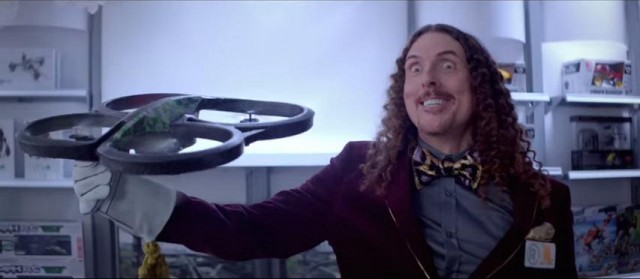“If That Thief Counts as a Customer, I Had Two Customers That Week:” A RadioShack Story

On Saturday, I went to see Big Hero 6 and they ran this commercial of Weird Al singing and dancing through a RadioShack.
“Wait,” I said to my friends, “Weird Al’s doing RadioShack commercials?”
“Yeah,” they said, like people who own a TV and see commercials all the time (as opposed to people who watch YouTube and Hulu and see commercials all the time, but these are different commercials — I know all about the Pemco Sunscreen Man).
“But wait,” I wanted to say, “didn’t you read the longform article about how RadioShack is a dying company that underpays its employees and barely gets any sales anymore?”
I didn’t say that, mostly because the Geico Gecko was telling an animated popcorn tub that it was time to be quiet and watch the movie. But I am ready to talk about the RadioShack story with you.
The piece, titled “A Eulogy for RadioShack, the Panicked and Half-dead Retail Empire,” went up the day before Thanksgiving. It’s sportswriter Jon Bois’ personal account of three years spent as a RadioShack employee, which includes anecdotes like:
The first day [of being the sole employee staffing a RadioShack], I opened the store for 12 hours, and not a single person walked in. The second day, a guy bought a watch battery, and the store revenue for the week upped to $2.99.
And:
At that point in my career, I would have at least had an honest-to-god name tag to indignantly throw on the ground. I spent my first year wearing this one, with my name handwritten on a scrap of paper I taped to it. They just wouldn’t order me one.
It’s the story of a business that cuts every corner: from not ordering nametags, to closing early when no customers show up, to paying its employees base plus commission and taking customer returns out of their paychecks.
Someone else came in to return a phone, so my sales are now about $60 in the hole. I make $5.45 an hour, and have worked a 16.5-hour shift, so that’s about $90. Minus the $60 I’ve lost, that’s $30. So today, I have made about $1.80 per hour, for a shift of nearly 17 hours. Before taxes.
Because it is also a corporate franchise, it also includes the standard posturing “from corporate:”
At least once a month, often on our days off, we were expected to show up, in dress code, to the district office for a two-hour meeting. Sometimes we’d be individually picked out and shamed as people whose sales numbers weren’t good enough for them. I still remember a woman crying in front of everyone and leaving in embarrassment.
This story shouldn’t be surprising to anyone who’s ever worked a retail commission-based job (it’s a bit like my adventures in telemarketing, for example). Yes, they take returns out of your paycheck, and yes, they holler at you about not making sales goals. What’s surprising, as Bois notes, is that RadioShack is still in business at all.
This is a consumer technology business that is built to work perfectly in the year 1975. The Internet comes around, and this, being a technology company, is expected to move on it aggressively and know what it’s doing, except basically nobody really understood the Internet for a very long time. So they whiffed big a few times. Then the iPhone came around and rendered half the stuff RadioShack sold completely redundant. This company needed to become something radically different a decade ago. I just don’t think it knows how to be anything else.
Read the whole piece — you’ll get the anecdote about the week Bois had two customers, one of them a thief — and then let’s talk about RadioShack, dying businesses, and your own retail horror stories.
Support The Billfold
The Billfold continues to exist thanks to support from our readers. Help us continue to do our work by making a monthly pledge on Patreon or a one-time-only contribution through PayPal.
Comments